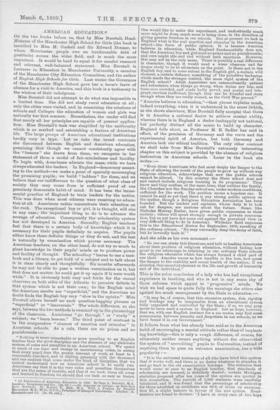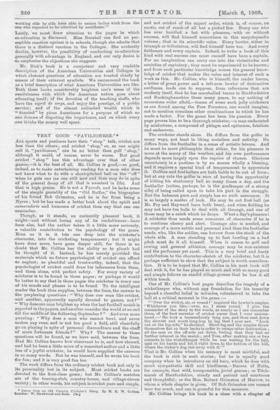AMERICAN EDUCATION.* •
Or the two books before us, that by Miss Burstall, Head- Mistress of the Manchester High School for Girls (the book is inscribed to Miss M. Gaskell and Sir Edward Donner, to whom Manchester people owe an irredeemable debt of gratitude) covers the wider field, and is much the more important. It would be hard to equal it for careful research and relevant, well-balanced statement. Miss Burstall is Lecturer in Education in Manchester University, a member of the Manchester City Education Committee, and the author of English High Schools for Girls. Last winter the Governors of the Manchester High School gave her a term's leave of absence for a visit to America, and this book is a testimony to the wisdom of their indulgence.
Miss But-stall did not attempt to do what was impossible in a limited time. She did not study rural education at all ; only the cities were visited, and in examining the relations of schools and Colleges the education of women and girls was naturally her first concern. Nevertheless, the reader will find that nearly all her principles are capable of general applica- tion. Miss Burstsll's -task was simplified by the uniformity
which is so marked and astonishing a feature of American life. The large groups of American educational institutions
hardly vary in type. Let us take the broad contrasts she discovered between English and American education, premising that though we cannot consistently agree with the "lessons" she draws from them, we recognise in her statement of them a model of fair-mindedness and lucidity. To begin with, Americans educate the mass, while we have always educated the leaders. In England—democracy assent- ing to the method—we make a point of specially encouraging the promising pupils; we build " ladders" for them, and we believe that our indifference to the question of what class of society they may come from is sufficient proof of our genuinely democratic habit of mind. It has been the imme- morial practice of England to train leaders for the nation. This was done when most citizens were receiving no educa- tion at all. Americans rather concentrate their attention on the ruck. The exceptional boy or girl, it is thought, will rise in any case; the important thing to do is to advance the average of education. Consequently the scholarship system has not developed in America. Secondly, English teachers feel that there is a certain body of knowledge which it is necessary for their pupils definitely to acquire. The pupils either know these definite things or they do not, and the test is naturally by examination which proves accuracy. The American teachers, on the other band, do not try so much to plant knowledge in their pupils' minds as to produce power and facility of thought. The schoolboy " learns to use a text-
book and a library, to get hold of a subject and to talk about it in class clearly and thoughtfully. Six months afterwards
he may not be able to pass a written examination on it, but that does not matter, he could get it up again if it were worth while." It is obviously both easy and futile for the casual observers on both sides of the Atlantic to perceive defects in that system which is not their own ; to the English mind the American results are "superficial," and the American no doubt finds the English boy very "slow in the uptake." Miss Burstall allows herself no such question-begging phrases as "superficial" or "inaccurate." The whole difference, as she says, between the two methods is summed up in the phraseology of the classroom. Americans " go through " or " study " a subject; we "learn lessons." The third point of contrast is in the comparative " absence of sanction and stimulus " in
American schools. As a rule, there are no prizes and no punishments :—
"Nothing is more remarkable or more puzzling to an English teacher than the good discipline and the absence of any elaborate system of rules and penalties in an American school. We spend so much of our time and energy in maintaining order, in seeing that every pupil does the proper amount of work, at least to a reasonable standard, and in dealing generally with the thousand and one matters that come under the head of discipline, that we cannot understand how an American school is so easily run. Americans say that it is the very rules and penalties themselves that are the cause of trouble, and that if we took them all away and trusted to freedom we should find our task as easy as theirs.
• (1) Impressions of American Education in 1008. By Sera A, Burstall, M.A. London : Longman and Co. [4e. Ad.] —(2) America at : as Seen by a Scots Graduate. By Itobeet K. Risk, M.A. With a Preface by Donald
MacaUstor, M.A., M.D., Principal of (}lassoes University. London : A. Constable and Co. [8s. 8d. not.]
One would like to make the experiment, and undoubtedly much more might be done, much more is being done, in the direction of giving greater freedom in our schools. But at present we lack is England what is the real sanction and stimulus in the American school—the force of public opinion. It is because America believes in education, while England fundamentally does not, that the American boy and girl need no prizes and no punishments ; and ours might idle and riot without such sanctions. However, this may not be the only cause. There is possibly a real difference in character, though it would need a wiser observer and far deeper study to be at all certain on the point. Is there not in the English boy, and to some extent in the English girl, a certain wild element, a certain defiance, something of the primitive barbarian which needs the stronger control, the more rigid system of the English school P Adult Americans are extraordinarily patient and submissive when things go wrong, when trains are late, and tram-cars crowded, and roads badly paved, and postal and tele- graph services inefficient, though they can be forceful and stern enough when they are really roused, as the Civil War proved."
"America believes in education,"—that phrase explains much, indeed everything, when it is understood in the sense (which, as she shows elsewhere, Miss Burstall fully accepts) that there is in America a national desire to achieve mental ability, whereas there is in England a desire (unhappily not national, but perfectly distinct all the same) to build up character. England fulls short, as Professor M. E. Sadler has said in effect, of the precision of Germany and the verve and the experimental spirit of America, but both Germany and America lack our ethical tradition. The only other contrast we shall take from Miss Burstall's extremely interesting chapter on this subject is provided by the absence of religious instruction in American schools. Later in the book she writes :— "Even those Americans who feel most deeply the danger to the State of allowing the youth of the people to grow up without any religious education, acknowledge that now the public schools cannot be altered. 'In this country the State school does not and cannot include religious training in its programme.' They know and they confess, at the same time, that neither the family, the Churches nor the Sunday-school are, under modern conditions, sufficient for the work. The position seems a hopeless ono. It cannot be said as yet that there is any strong public opinion on the matter, though a Religious Education Association has been founded. But the leaders and captains, whose duty is to look out for dangers, are anxious about the future. Some, like Nicholas Murray Butler, have given public expression to their anxiety ; others will speak strongly enough in private conversa- tion, but as yet have not come out against the prevalent view (a very difficult thing to do in America). Whitelaw Reid expresses this in the Educational Review for September, 1003, speaking of the ordinary citizen. He may outwardly deny the decay of faith, but he inwardly feels it' "
And she adds as her own comment :-
" No one can study this literature, and talk to leading Americans about their problem of religious education, without feeling how great is our advantage in retaining in our ordinary State schools the religious education which has always formed a chief part of our ideal. America warns us how terrible is the loss, how great the danger to the stability and moral health of the nation, if we abandon this essential element in the life and growth of humanity and of the individual."
This is the sober conclusion of a lady who has had exceptional experience in teaching, and who is not in any sense shy of those reforms which appeal to "progressive" minds. We wish we had space to quote fully the warnings she utters also against too much management by the State in education
"It may be, of course, that this excessive system, this rigidity and bondage may be inseparable from an educational system fully organised and controlled by the State ; if so, we may pray never to have such a system in England. Lot us hope, however, that we, with our English instinct for a via media, may find some compromise between anarchy and despotism in our schools, as we have found it in our Government."
It follows from what has already been said as to the American habit of encouraging a mental attitude rather than of implant- ing knowledge—this is only a rough difference, of course, for ultimately neither means anything without the other--that the system of " accrediting" pupils to Universities, instead of requiring them to pass an entrance examination, has a wide
popularity:— "It is the universal testimony of all who have tried this system that it works well, and there is no desire whatever to abandon it and go back to the old examination bondage. The criticism that would occur at once to an English teacher, that standards of scholarship are lowered, is definitely denied; certain Michigan statistics prepared after ten years of the system are quoted in this connection. The records of 1,000 students were carefully tabulated, and it was found that the percentage of scholarship for those admitted on certificate was 88.0, of those on examina- tion 87, a slight balance in favour of the new system, Head- masters are found to declare : I have in every case of two boys
working side by side been able to secure bettor work from the one who expected to be admitted by certificate."
Lastly, we must draw attention to the pages in which co-education is discussed. Miss Burstall can find no per- ceptible reaction against it in schools, though she admits that there is a distinct reaction in the Colleges. She evidently doubts, however, the possibility of conducting co-education .generally with advantage in England, and our only desire is 'to emphasise the objections she suggests.
Mr. Risk's book is a competent and very readable description of the American UniVersities and Colleges in which abstract questions of education are treated chiefly by means of their external symbols. We recommend the book as a brief description of what American Universities are like. 'Both these books considerably heighten one's sense of the resoluteness with which the American nation goes about educating itself ; of the devotion of the teaching staffs, who have the esprit de corps, and enjoy the prestige, of a public 4service; and of the almost unlimited wealth which is donated" by pious Americans for a purpose of which no -one dreams of disputing the importance, and on which every one thinks the money well spent.















































 Previous page
Previous page